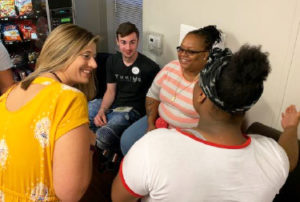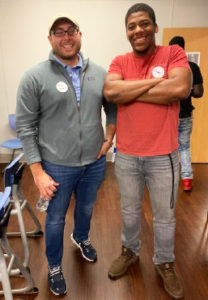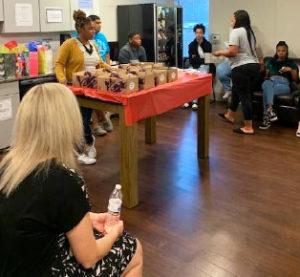UCC-related Elon Homes’ Foster Care Village Meets, Surpasses Two-Year Goals

Residents and mentors share stories during a group meeting.
The data is in, and it’s stunning! In its first two years of operation, UCC-related Elon Homes’ Foster Care Village has met or exceeded its goals in providing care and assistance to its young adult residents. From residents enrolling in further education or finding jobs to learning more about household finance and credit counseling, the young men and women who live at Foster Care Village are taking the first steps to successful adulthood.
“Without question, this program has been life changing for some of our youth,” says Fred Grosse, president and CEO of Elon Homes. “Some have come to us from homelessness, some from less than ideal settings, and some have even come here for a ‘gap year’ to better prepare themselves to move away to a four-year college.”
In May 2017, Charlotte, N.C.-based Elon Homes opened Foster Care Village — a place for young adults under age 21 who’ve “aged out” of the foster care system to find the role models, structure, and resources they need to transition to successful adult lives. Foster Care Village is the latest avenue Elon Homes has created to provide safe haven, education, and employment opportunities for children and youth.
Located on the campus of Elon partner Johnson C. Smith University in West Charlotte, the first phase of Foster Care Village was a men’s dormitory. A women’s building opened in March of this year. Foster Care Village staff use the Transition to Independence Process (TIP) Model in structuring the program. TIP is an evidence-based model that uses a positive development approach. It has been demonstrated to provide a pathway for young adults to employment, future education, healthy living, well-being, and community life functioning.
“We find that the goals set under TIP programming are realistic and give the youth a sense of accomplishment OR a sense that they need to do more work to stay on track for success,” says Grosse. “The model allows the staff and the youth together to monitor performance of the youth.”

A resident meets with a mentor volunteer.
In the past two years, these are some of Foster Care Village’s successes:
- 80 percent of program participants enroll in GED, high school, vocational, community college or a four-year program within 30 days of placement;
- 75 percent of program participants earn a GED or high school diploma within 12 months of placement;
- 75 percent of program participants in school show an increase in education status with 12 months of enrollment;
- 80 percent of program participants not enrolled in school are employed or enrolled in vocational rehabilitation or training within 90 days of placement;
- 100 percent of program participants receive household finance counseling, credit counseling, and personal records/identity safeguard instruction within 3 months of entering the program;
- 100 percent of program participants receive behavioral health assessment and, as necessary, begin appropriate therapeutic treatment within 30 days of admission;
- 100 percent of participants receive continuing drug and alcohol abuse prevention education within 3 months of placement;
- 100 percent of program participants receive health assessments and assignment to a primary health care provider within 30 days of placement.
The accomplishments by the young adults in the program is due in large part to the adult mentors who work with Foster Care Village’s residents. “Youth in foster care typically have few, if any, role models,” says Grosse. “A role model can make the difference between success and failure in the life of a child.”
The mentoring process is carefully guided. Trained mentors meet regularly as a team to support each other. Additionally, mentors and village residents meet as a group every other month to allow time for interaction. “It takes about 6-to-8 months before a mentor and a youth find they are a good ‘fit’ for each other and begin to meet outside the larger group meetings,” Grosse adds.
At each step in the process, the voices of the young adults are encouraged and heard, says Grosse. “Every Monday night is a ‘house meeting,’ where all residents and staff meet to discuss a topic (such as financial planning, hygiene, personal boundaries, employment, or a similar item). Mentors and donors are invited to attend these meetings to interact with and support the youth,” he says.

Prior to an evening meal, April Rainer, program director, gives special awards to residents.
One of highlights of the group meetings are awards. “Awards are given out when they are deserved,” Grosse says. “They are given out to youth, as elected by staff, to recognize personal commitment and achievement. Awards are always given out at group meetings so the youth are publicly recognized and so other youth see the good that comes with trying to succeed.”
Grosse says that while a majority of the youth “get it” and make real changes, “others do not make such a pronounced change, but it is our hope that exposure to the program will plant a seed for their maturity later in life.” But all of the youth are “extremely grateful to have a clean, safe place to live and adults around them to protect and guide them.”
Foster Care Village already boasts several success stories. “We have a number of youth who have been in the program and now are successfully employed, are living independently, have shed some pronounced negative behaviors, or who have received medical and behavioral testing resulting in treatment or administration of medication,” Grosse says. “We have other youth who have developed better relationships with biological family members, or who have developed good mentoring relationships.”
Moving into the future, Foster Care Village is adding several new outcome goals to the TIP goals, including assistance exploring future housing options, maintaining employment, and opening checking accounts.
In the end, says Grosse, the youth on the threshold of adulthood at Foster Care Village are like all young adults. “If one were to spend time with our youth, or at a Monday night meeting, it would be plainly obvious that these are great kids who, as children of God, have wonderful potential for today and tomorrow,” he says. “It is a testament to the grace of God that each of these youth is alive today, that many of them have a positive outlook on life, and that those who still bear the scars of abuse, abandonment, and neglect will here see unconditional love from staff and volunteers.”
Join Our Mailing LIst
"*" indicates required fields
